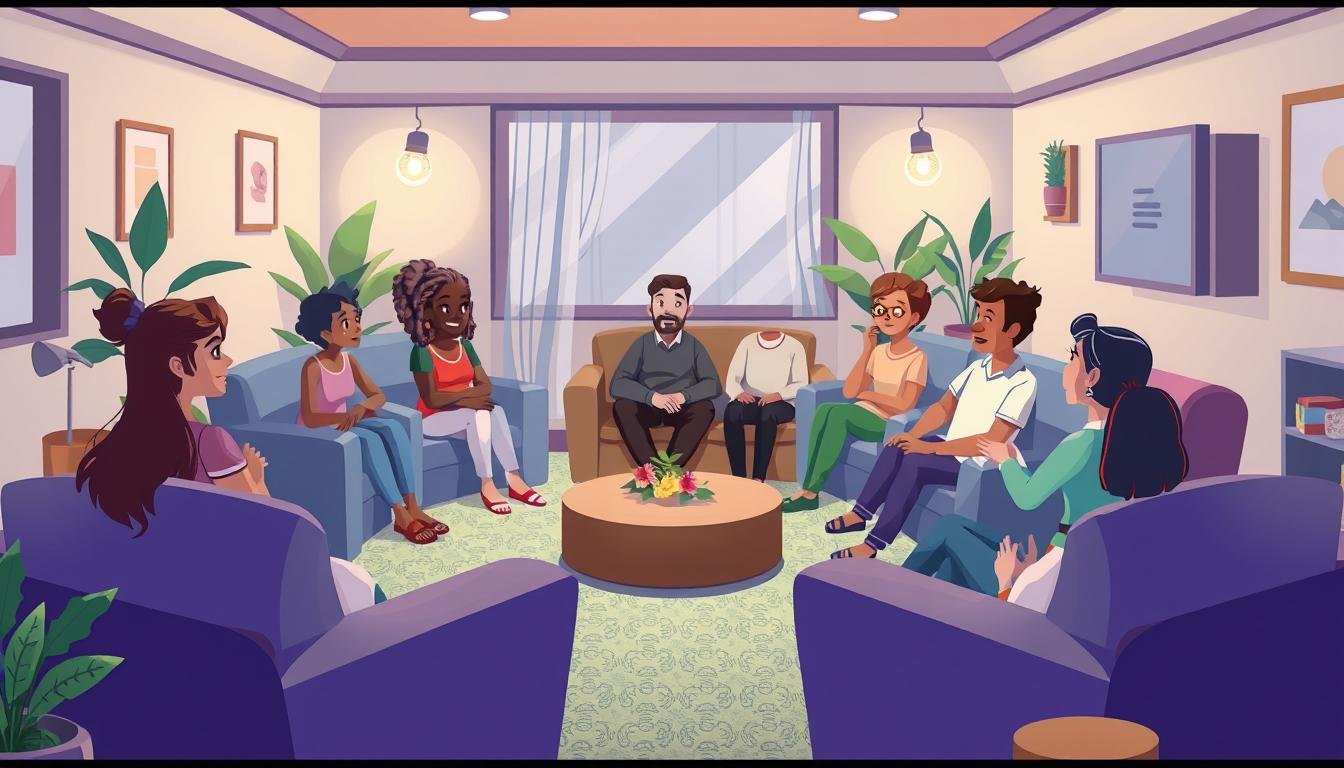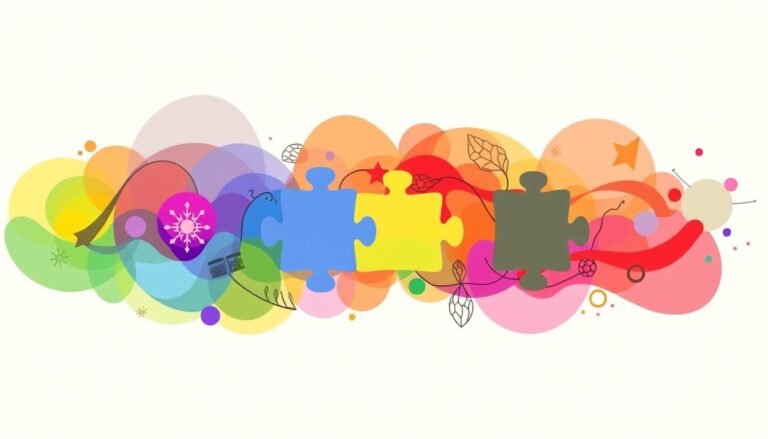Group Therapy: Healing Together in a Supportive Setting
Have you ever thought about how talking to others could help you grow and heal? Group therapy is a special way to get help for your mind, where people come together to support each other. It’s all about working towards wellness together.
In group therapy, you find comfort in knowing you’re not alone. These groups are safe places where people share their struggles, fears, and successes. It’s a chance to learn from others and improve your communication skills.
Group therapy has many advantages. It’s cheaper than one-on-one therapy, making it easier for more people to get help. It also helps you become better at listening and talking, which is key for dealing with life’s challenges.
Let’s dive into the world of group therapy and see how it can change lives. It builds strength and creates strong bonds. Are you ready to see how shared experiences can heal?
Understanding Group Therapy
Group therapy is a special way to help with mental health. It lets people share their stories and heal together. It’s often cheaper and easier to get to than one-on-one therapy.
Definition and Core Principles
Group therapy has 8 to 12 people meeting with a therapist. Some groups are open, welcoming new members anytime. Others are closed, keeping the same group. The main ideas are keeping things confidential, supporting each other, and learning together.
The Role of the Therapist
Therapists lead group talks, make sure everyone gets a chance to speak, and keep things safe. They teach people how to cope and improve their relationships. They might use cognitive behavioral therapy to help with different problems.
Types of Group Therapy
There are many kinds of group therapy, each for different needs:
- Cognitive Behavioral Therapy (CBT) groups
- Family therapy sessions
- Trauma groups
- Addiction groups
| Type | Focus | Typical Issues Addressed |
|---|---|---|
| CBT Groups | Changing thought patterns | Depression, anxiety, anger management |
| Family Therapy | Improving family dynamics | Communication issues, conflict resolution |
| Trauma Groups | Processing traumatic experiences | PTSD, abuse recovery |
| Addiction Groups | Supporting recovery | Substance use disorders, behavioral addictions |
These different group therapies meet many mental health needs. They offer specific support and treatment.
The Power of Shared Experiences
Group therapy uses shared experiences to help people heal and grow. In support groups and group counseling, people find they’re not alone. This feeling of connection helps reduce the isolation that often comes with mental health issues.
Interpersonal therapy in groups offers a special chance to learn from each other. Everyone brings their own views, creating a rich mix of insights and strategies. This mix can lead to big breakthroughs and new ways of thinking about personal problems.
The group setting is a safe place to try out new behaviors and ways of talking. With a skilled therapist’s help, members can practice being assertive, setting boundaries, and expressing themselves well. This practice is key for personal growth and better social skills outside the group.
“Group therapy is like a mirror reflecting our shared humanity. It reminds us that we’re all in this together, struggling, growing, and healing as one.”
The strength of group therapy is in its ability to mirror the real world. Here, people can tackle interpersonal challenges, get feedback right away, and feel the power of mutual support. This journey together towards better mental health can change lives, offering hope and strength to all who join.
| Benefits of Shared Experiences in Group Therapy | Impact on Participants |
|---|---|
| Reduced Isolation | Increased sense of belonging and community |
| Diverse Perspectives | Enhanced problem-solving and coping strategies |
| Safe Practice Environment | Improved social skills and confidence |
| Mutual Support | Greater emotional resilience and healing |
Benefits of Group Therapy
Group therapy is a powerful way to get mental health support. It’s a place where people can heal together. They share their stories and learn from each other.
Mutual Support and Connection
In group counseling, people find comfort in knowing they’re not alone. They feel a sense of belonging, which helps with feelings of isolation. The support and understanding they share can be very healing.
Diverse Perspectives
Group therapy offers a chance to see things from different angles. People at different stages of their journey share their insights. This diversity makes the therapy more enriching.
Improved Social Skills
Being in a group helps improve social skills. People learn to listen better, be empathetic, and communicate well. These skills help in personal growth and better relationships outside the group.
Cost-Effectiveness
Group therapy is often cheaper than one-on-one sessions. This makes mental health support more accessible. Many find group sessions just as helpful as individual therapy.
| Benefit | Description |
|---|---|
| Mutual Support | Reduces isolation, fosters understanding |
| Diverse Perspectives | Offers new insights and coping strategies |
| Social Skills | Improves communication and empathy |
| Cost-Effectiveness | More affordable, accessible therapy option |
Group therapy sessions usually have 5 to 15 people. They meet weekly for one to two hours. This setting helps build strong connections and progress over time. It’s great for tackling specific issues or improving overall mental wellness.
Group Therapy Process
Group therapy is led by trained therapists in structured sessions. These groups have 5-10 people and one or two therapists. Each stage is important for healing.
At first, the goal is to build trust. People share their problems as they feel ready. This safe space helps them express feelings they’ve kept hidden.
As the group goes on, people face challenges again. Feedback from others helps them see their patterns. This group setting is special for growing together.
Cognitive behavioral therapy is used to try new behaviors. It helps with anxiety, depression, and PTSD. This way, members learn and grow.
| Stage | Focus | Activities |
|---|---|---|
| Initial | Trust-building | Introductions, setting ground rules |
| Middle | Open communication | Sharing experiences, giving feedback |
| Advanced | Behavioral changes | Role-playing, applying new skills |
Group therapy has many benefits. It’s faster and more accessible, especially in rural or low-income areas. It creates a community that supports healing and growth.
Challenges and Considerations in Group Settings
Group counseling has its own set of challenges. Both therapists and participants face hurdles. These include managing group dynamics and addressing confidentiality concerns.
Navigating Group Dynamics
Diverse personalities and opinions can cause conflicts in support groups. Therapists need to guide these interactions well. This keeps the group atmosphere productive.
Starting a group session quickly is key. A study showed that starting within 30 seconds boosts effectiveness.
Confidentiality Concerns
Keeping information private is crucial in group therapy. Participants must feel safe sharing their stories. This trust is vital for healing and growth.
Overcoming Fear of Self-Disclosure
Many people are hesitant to share in groups. This fear can slow progress, especially for those with social anxiety or trauma. Therapists work to create a safe space for sharing.
| Challenge | Impact | Solution |
|---|---|---|
| Punctuality | Disrupts session flow | Virtual options for flexible joining |
| Varied abilities | Uneven participation | Adaptive challenge levels |
| Documentation | Increased workload | Streamlined reporting systems |
Despite challenges, group therapy has many benefits. It offers a sense of belonging and cost-effective treatment. With the right approach, these obstacles can be overcome, leading to positive outcomes.
Group Therapy for Specific Mental Health Issues
Group therapy is a strong tool for tackling mental health problems. Trauma groups provide a safe place for survivors to share and heal together. They help members deal with their feelings and find ways to cope in a supportive setting.
Addiction groups are key in recovery. They offer strength through unity, as members share their battles and celebrate victories. These groups follow a plan, giving support and motivation on the recovery path.
Grief support groups offer comfort to those who have lost someone. People can share their feelings, learn from others, and find comfort in shared experiences. These groups help navigate the complex emotions of grief and loss.
Research proves group therapy works for many issues, like depression, anxiety, and eating disorders. It can be as good as one-on-one therapy for many problems. With more people needing mental health help, group therapy is a cost-effective way to reach more people.
Source Links
- Group Therapy- A Safe Space for Shared Healing — Brighter Tomorrow Counseling Services
- Group Therapy for Teens: Finding Connection and Healing Together
- Group Counseling: A Way to Get Help Now with Continental W..
- Understanding Group Therapy and Support Groups
- How Group Therapy Works
- The Power of Shared Experiences- Embracing Group Therapy — Abundance Therapy Center
- The Power of Group Therapy: How Shared Experiences Can Help You Heal | Grouport Journal
- Behavior & Mental Health Services in NY | Citizen Advocates
- Psychotherapy: Understanding group therapy
- About Process Groups – CSU Health Network
- Group Therapy – StatPearls – NCBI Bookshelf
- Overcoming 6 challenges of group therapy
- Group Therapy: Problems Solved, Types, Benefits and Drawbacks
- Group Therapy for Mental Health Problems
- Group therapy is as effective as individual therapy, and more efficient. Here’s how to do it successfully
- Group Therapy








